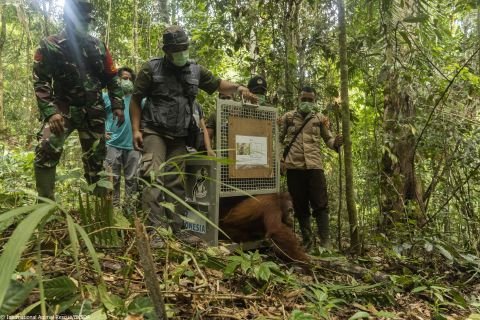
Five orangutans released back into the wild in West Borneo had previously all been rescued from captivity after their mothers had been killed so that their babies could be captured and sold as pets.
Prior to their release, the orphaned orangutans had spent years undergoing rehabilitation at an orangutan centre in Ketapang, West Borneo.
The release was carried out by the Natural Resources Conservation Agency for West Kailmantan (BKSDA), the Bukit Baka Bukit Raya National Park (TNBBBR) and a team from International Animal Rescue (IAR) Indonesia. The lengthy operation coincided with the commemoration of Orangutan Caring Week between 8-14 November.
The five orangutans consisted of three males named Jacky, Beno and Puyol, and two females named Oscarina and Isin.
Isin was the most recent orangutan to be rescued, from Kayong Utara district in 2017, while Puyol has spent the longest time in the IAR rehabilitation centre, having been rescued in the Kendawangan area in 2010. Jacky was rescued from the Muara Pawan area in August 2013, Beno from the Simpang Dua area in 2015 and Oscarina was rescued from Pontianak in 2011.
The rehabilitation process is not always straightforward and can take some considerable time, depending on the circumstances and needs of the individual. Rehabilitation is necessary to develop the orangutans’ ability to survive in their natural habitat.
In the wild baby orangutans will stay with their mothers until the age of 7-8 years and learn from their mothers. Because these baby orangutans were forcibly separated from their mothers in order to be sold as pets, they were deprived of the opportunity to master the necessary survival skills.
The head of the TNBBBR Centre, Agung Nugroho, stated that this release activity was carried out through a series of activities and studies. He hopes that the orangutans released in the TNBBBR area will be able to form new populations and maintain the existence of their species. Previously, in February 2020, his party also released five individual orangutans.
“All these activities and studies are carried out to ensure that all orangutans who have been released can live safely and have adequate food. When a release has been carried out, it doesn’t mean our work is done. The monitoring team will continue its work to ensure that each released orangutan can adapt to its new habitat,” he said.
The TNBBBR area was chosen as a release site because, based on the results of a survey that had been conducted, the number of tree species providing food for the orangutans was high while the natural population of orangutans was quite low.
To reach the release site, the orangutan release team must travel 700 kilometres overland and continue by boat and on foot. It can take up to three days to reach the point of release from IAR Indonesia’s orangutan rehabilitation centre in Ketapang. However, the status of the area as a National Park will ensure the safety of the animals in it.
“With the release of these five orangutans, 51 orangutans have been released in the working area of the TNBBBR Centre, consisting of ten wild orangutans that have been translocated and 41 rehabilitated orangutans from the Ketapang Orangutan Conservation Centre,” said Agung.
Meanwhile, the Head of the West Kalimantan BKSDA, Sadtata Noor Adirahmanta, in his statement conveyed that animal rescue in the form of evacuation and translocation, as well as several other activities, such as counselling and awareness, were part of the solution to animal and human conflicts. It needs to be realised together, that as part of the ecosystem and as part of nature, humans must be able to accept the presence of other natural components, including wildlife.
“It’s time for each to learn to live side by side in harmony. Humans as creatures that are considered the smartest, have the greatest responsibility to create and maintain the harmony of nature,” he said.
This wild release programme has proved so successful that three baby orangutans have been born naturally in the Bukit Baka Bukit Raya National Park area to the rehabilitated orangutans released there. The birth of a new generation of orangutans has fuelled hopes that the orangutan population in the Bukit Baka Bukit Raya National Park and in West Kalimantan in general will be maintained and sustainable.
Alan Knight OBE, Chief Executive of International Animal Rescue, said: “It’s always a joyful occasion when orangutans are released back into their natural habitat. It gives us all hope for the future of the species, as well as for the future of the forest as a whole and for every living creature that depends on it for survival.”

